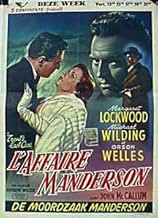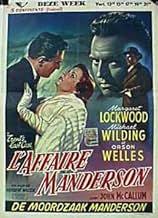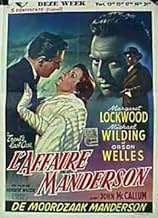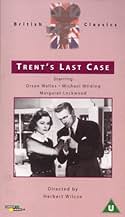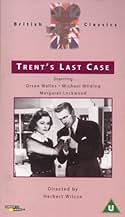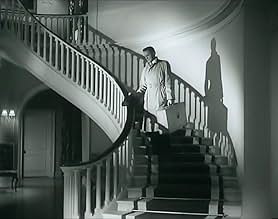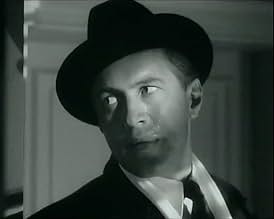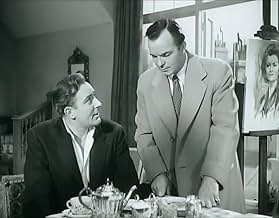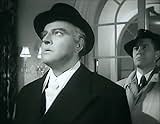A reporter investigates a rich businessman's death. While police rule it suicide, Trent believes it's murder and grows intrigued by the widow and secretary.A reporter investigates a rich businessman's death. While police rule it suicide, Trent believes it's murder and grows intrigued by the widow and secretary.A reporter investigates a rich businessman's death. While police rule it suicide, Trent believes it's murder and grows intrigued by the widow and secretary.
- Director
- Writers
- Stars
Geoffrey Bayldon
- Reporter in Court
- (uncredited)
Ernest Blyth
- Concert Attendee
- (uncredited)
Robert Cawdron
- Police Constable
- (uncredited)
John Chandos
- Tim O'Reilly
- (uncredited)
Anthony Collins
- Conductor
- (uncredited)
Henry Edwards
- Coroner
- (uncredited)
Eileen Joyce
- Pianist
- (uncredited)
Ben Williams
- Jimmy - Reporter
- (uncredited)
Kenneth Williams
- Horace Evans
- (uncredited)
- Director
- Writers
- All cast & crew
- Production, box office & more at IMDbPro
Featured reviews
Unlike the other reviewers above, I enjoyed this film immensely, probably because I am a Margaret Lockwood fan and collect as many of her films as I can when they are available.This one is not commercially available but I managed to find a dealer on Ebay who specialises in the older films I like.The other reviewers mention it is too "talky" but this is not supposed to be "Die Hard" or even a James Bond adventure.It is a cultured British film, from Republic films, from 1952 with an excellent cast who speak with wonderful diction and enunciation before "kitchen sink drama" mesmerised film producers.Herbert Wilcox (Anna Neagle's husband) produced this gripping thriller that keeps you guessing right up to the very end.I will concede that the plot is at times a bit like an amateur dramatic society but this gives it its intrinsic charm especially when the principal parts are played by good professional actors.An example is Orson Wells sitting in an armchair and filmed from the rear redolent of a James Bond villain.He only needed to be stroking a white cat on his lap!! Michael Wilding plays his usual debonair self as "Philip Trent" the artistic crime reporter.Margaret Lockwood plays again the pianoforte (see my critique of "Love Story" (1944) when she played Lissa Campbell),This time we have the pleasure of listening to Eileen Joyce (the real pianist) playing the famous Mozart piano concerto no:24 in C minor, larghetto movement.Eileen's other famous film credit was playing the Rachmaninov 2nd piano concerto in C minor for "Brief Encounter (1945).Orson as mentioned was fond of Shakespeare's "Othello" and some of this plot is worked into this film.Like "The Third Man" (1949), Orson does not appear until late into the film but he immediately makes his not inconsiderable presence felt as "Sigsbee Manderson".Margaret plays Margaret Manderson his wife.No trouble remembering her name by the cast!John McCallum gives a workmanlike performance as John Marlowe, the secretary to Manderson and Miles Malleson for once leaves aside his clerical garb to play Burton Cupples, Margaret's uncle.What amused me was seeing a very young Kenneth Williams playing a garrulous Welsh gardener! You would only see this film if you you actively set out to acquire it since it never appears on the the TV and as I said is not commercially available.Obviously being a thriller I will not divulge the plot.Suffice to say it ends happily for all concerned.I rated it 8/10. Since I wrote this critique in July 2007 this title is now commercially available from www.silversirens.co.uk Enjoy!
Agatha Christie considered this intrigue one of the best ever written, and it certainly is. The mystery is deep here, and as it gradually is unravelled you are in for any number of surprises. The actors are outstanding, with Michael Wilding as the detective intruding on the private lives of the young widow Margaret Lockwood and the man who loves her, who is the prime suspect, while Orson Welles as the victim provides an impressing finale as he enters in the final flashback. Miles Malleson plays an important part as a reluctant participant in the plot, while the story is what really matters. Herbert Wilcox' direction is faultless but very formal, giving the film a somewhat conventional character - there is no cinematography to speak of, while music plays an important part - Eileen Joyce has a moment as a performing pianist, and the film score is by Anthony Collins, who is also seen acting as a conductor - one of his rare appearances on film. After having reached the end of the story, and Michael Wilding closing his last case as Trent, yuo just have to agree with Agatha Christie about the marvellous windings of this plot.
It's good news for Welles completists that this, the better of the two films he made for Herbert Wilcox in 1952 (to help finance his on-off-on but finally magnificent film of 'Othello') is now available on DVD, though dismally free of extras. As a thriller it is a puzzle almost devoid of suspense, though there are some clever twists at the end. There are polished performances by Margaret Lockwood, John McCallum, Michael Wilding as the classy sleuth Trent, Miles Malleson in one of his best roles and Welles. Welles appears for no more than 20 minutes, in flashback, but, with his formidable false nose, is an intimidating presence as the late Sigsbee Manderson. In a fraught dialogue with McCallum he talks about 'Othello' and the production he's recently seen: "Didn't like the leading actor!" The leading actor was Welles himself, performing at the St James' theatre - a performance I was privileged have seen a year or two earlier, when Ken Tynan, long before PC was thought of, headed his review 'Citizen Coon'!
Michael Wilding takes up "Trent's Last Case" in this 1952 film directed by Herbert Wilcox for Republic Studios. It's British with a British cast that includes Margaret Lockwood, John McCallum, Hugh McDermott, and one American, Orson Welles, who was probably trying to raise money for a project.
Trent is an artist and also an amateur detective. He gets involved in the suicide of a wealthy man named Manderson, but as he investigates, it looks more and more like murder. One suspect stands out, but how to prove it?
Unlike many detectives in books and movies, Trent is fallible. This is a neat mystery with a few red herrings. I don't agree that it was dull; I think the story itself keeps the film going, as well as the attractive Michael Wilding. Wilding falls in with many of those tall, good-looking British actors from the '50s - Robert Flemying, Michael Rennie, etc., and probably wouldn't be well known here if he hadn't married Elizabeth Taylor. Nevertheless, he was quite urbane with a great voice and acquits himself well as Trent. Margaret Lockwood is lovely as the victim's widow, and she keeps you guessing.
Not as bad as some reviewers claim. Maybe not as good either, but I enjoyed it. Orson Welles apparently had an obsession with using fake noses on his characters. It's really obvious in profile.
Trent is an artist and also an amateur detective. He gets involved in the suicide of a wealthy man named Manderson, but as he investigates, it looks more and more like murder. One suspect stands out, but how to prove it?
Unlike many detectives in books and movies, Trent is fallible. This is a neat mystery with a few red herrings. I don't agree that it was dull; I think the story itself keeps the film going, as well as the attractive Michael Wilding. Wilding falls in with many of those tall, good-looking British actors from the '50s - Robert Flemying, Michael Rennie, etc., and probably wouldn't be well known here if he hadn't married Elizabeth Taylor. Nevertheless, he was quite urbane with a great voice and acquits himself well as Trent. Margaret Lockwood is lovely as the victim's widow, and she keeps you guessing.
Not as bad as some reviewers claim. Maybe not as good either, but I enjoyed it. Orson Welles apparently had an obsession with using fake noses on his characters. It's really obvious in profile.
This is pure whodunit,in the grand tradition of Agatha Christie and there are similarities with the lady of crime's "murder on the links" ,but the solution is not as brilliant as hers ,because in this field,she has no equal.
Anyway ,everyone who likes Christie will relish .A desirable mansion ,where a man took his own life (or was it murder?) and suspects including two secretaries,one of whom may be in love with the dead's wife and the other one may be jealous.But the main asset of the movie is the wealthy (suicidal?) businessman ,masterfully portrayed by Orson Welles whom we only see in flashbacks :the scene when we hear his formidable voice ,but only the back of his armchair gives the jitters. Michael Wilding has no gray cells,but he displays flair for clues ,as though he had be trained by Hercule Poirot.Entertaining whodunit.
Anyway ,everyone who likes Christie will relish .A desirable mansion ,where a man took his own life (or was it murder?) and suspects including two secretaries,one of whom may be in love with the dead's wife and the other one may be jealous.But the main asset of the movie is the wealthy (suicidal?) businessman ,masterfully portrayed by Orson Welles whom we only see in flashbacks :the scene when we hear his formidable voice ,but only the back of his armchair gives the jitters. Michael Wilding has no gray cells,but he displays flair for clues ,as though he had be trained by Hercule Poirot.Entertaining whodunit.
Did you know
- TriviaIn the film, Sigsbee Manderson (played by Orson Welles) mentions a performance of Shakespeare's "Othello" at the St. James Theatre in London in 1951, in which he disliked the leading actor's performance. This is an in-joke: Welles himself played Othello at the St. James in 1951, under his own direction. Peter Finch played Iago opposite him.
- GoofsDuring the coroners inquest, Trent was seen drawing a sketch of Marlowe. This is not allowed in English Courts. Although court artists are allowed in as members of the public, all drawings must be done by memory outside the courtroom.
- Quotes
Margaret Manderson: He talks of reopening the case.
John Marlowe: You should've ordered him out of the house.
Margaret Manderson: And confirm his suspicions?
- SoundtracksPiano Concerto in C Minor
Music by Wolfgang Amadeus Mozart (as Mozart)
Arranged and Conducted by Anthony Collins (uncredited)
Performed by Eileen Joyce
Details
- Release date
- Country of origin
- Language
- Also known as
- Trentov poslednji slucaj
- Production company
- See more company credits at IMDbPro
- Runtime
- 1h 30m(90 min)
- Color
- Aspect ratio
- 1.37 : 1
Contribute to this page
Suggest an edit or add missing content

